CC Madhya 24.262 (1975): Difference between revisions
(Vanibot #0027: CCMirror - Mirror CC's 1996 edition to form a basis for 1975) |
(Vanibot #0020: VersionCompareLinker - added a link to the Version Compare feature) |
||
| Line 2: | Line 2: | ||
<div style="float:left">'''[[Sri Caitanya-caritamrta (1975)|Śrī Caitanya-caritāmṛta (1975)]] - [[CC Madhya (1975)|Madhya-līlā]] - [[CC Madhya 24 (1975)|Chapter 24: The Sixty-One Explanations of the Atmārāma Verse]]'''</div> | <div style="float:left">'''[[Sri Caitanya-caritamrta (1975)|Śrī Caitanya-caritāmṛta (1975)]] - [[CC Madhya (1975)|Madhya-līlā]] - [[CC Madhya 24 (1975)|Chapter 24: The Sixty-One Explanations of the Atmārāma Verse]]'''</div> | ||
<div style="float:right">[[File:Go-previous.png|link=CC Madhya 24.261 (1975)|Madhya-līlā 24.261]] '''[[CC Madhya 24.261 (1975)|Madhya-līlā 24.261]] - [[CC Madhya 24.263 (1975)|Madhya-līlā 24.263]]''' [[File:Go-next.png|link=CC Madhya 24.263 (1975)|Madhya-līlā 24.263]]</div> | <div style="float:right">[[File:Go-previous.png|link=CC Madhya 24.261 (1975)|Madhya-līlā 24.261]] '''[[CC Madhya 24.261 (1975)|Madhya-līlā 24.261]] - [[CC Madhya 24.263 (1975)|Madhya-līlā 24.263]]''' [[File:Go-next.png|link=CC Madhya 24.263 (1975)|Madhya-līlā 24.263]]</div> | ||
{{CompareVersions|CC|Madhya 24.262|CC 1975|CC 1996}} | |||
{{RandomImage}} | {{RandomImage}} | ||
==== TEXT 262 ==== | ==== TEXT 262 ==== | ||
| Line 11: | Line 10: | ||
<div class="verse"> | <div class="verse"> | ||
:āmi tomāya bahu anna pāṭhāimu dine | :āmi tomāya bahu anna pāṭhāimu dine | ||
:sei anna labe, yata khāo dui- | :sei anna labe, yata khāo dui-jane" | ||
</div> | </div> | ||
| Line 25: | Line 24: | ||
<div class="translation"> | <div class="translation"> | ||
"Nārada Muni continued, 'I shall send sufficient food to you both every day. You can take as much food as you want.' | |||
</div> | </div> | ||
| Line 32: | Line 31: | ||
<div class="purport"> | <div class="purport"> | ||
When a person takes to Kṛṣṇa consciousness, there is no need to care for material necessities. Kṛṣṇa says | When a person takes to Kṛṣṇa consciousness, there is no need to care for material necessities. Kṛṣṇa says that He personally carries all the necessities to His devotees. | ||
:ananyāś cintayanto māṁ | |||
:ye janāḥ paryupāsate | |||
:teṣāṁ nityābhiyuktānāṁ | |||
:yoga-kṣemaṁ vahāmy aham | |||
"Those who worship Me with love and devotion, meditating on My transcendental form-to them I carry what they lack and preserve what they have." ([[BG 9.22 (1972)|BG 9.22]]) Why should one be anxious about the necessities of life? The principle should be that one should not want more than what is absolutely necessary. Nārada Muni advises the hunter to accept only what is absolutely necessary for him and his wife. The devotee should always be alert to consume only those things that he absolutely requires and not create unnecessary needs. | |||
</div> | </div> | ||
Latest revision as of 15:32, 27 January 2020

A.C. Bhaktivedanta Swami Prabhupada
TEXT 262
- āmi tomāya bahu anna pāṭhāimu dine
- sei anna labe, yata khāo dui-jane"
SYNONYMS
āmi—I; tomāya—for you; bahu—much; anna—food; pāṭhāimu—shall send; dine—every day; sei—that; anna—food; labe—you shall take; yata—whatever; khāo—you can eat; dui-jane—both of you.
TRANSLATION
"Nārada Muni continued, 'I shall send sufficient food to you both every day. You can take as much food as you want.'
PURPORT
When a person takes to Kṛṣṇa consciousness, there is no need to care for material necessities. Kṛṣṇa says that He personally carries all the necessities to His devotees.
- ananyāś cintayanto māṁ
- ye janāḥ paryupāsate
- teṣāṁ nityābhiyuktānāṁ
- yoga-kṣemaṁ vahāmy aham
"Those who worship Me with love and devotion, meditating on My transcendental form-to them I carry what they lack and preserve what they have." (BG 9.22) Why should one be anxious about the necessities of life? The principle should be that one should not want more than what is absolutely necessary. Nārada Muni advises the hunter to accept only what is absolutely necessary for him and his wife. The devotee should always be alert to consume only those things that he absolutely requires and not create unnecessary needs.